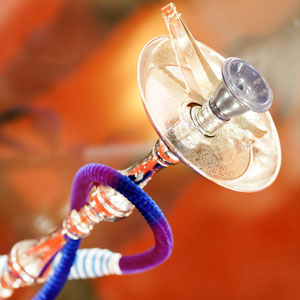 Label information on many hookah tobacco products is misleading and may be misinterpreted by consumers, according to new research on nicotine and pH levels in hookah tobacco. The study, led by Roswell Park Cancer Institute scientists, has been published online ahead of print in the journal Tobacco Regulatory Science.
Label information on many hookah tobacco products is misleading and may be misinterpreted by consumers, according to new research on nicotine and pH levels in hookah tobacco. The study, led by Roswell Park Cancer Institute scientists, has been published online ahead of print in the journal Tobacco Regulatory Science.
For the study, researchers examined the nicotine content and pH levels of 140 different packages of 12 brands of waterpipe tobacco. The products were analyzed in three groups corresponding to three types of hookah tobacco—unwashed, washed or herbal.
They found that the nicotine levels in washed products were 236 percent higher, overall, than the product labeling claimed. Levels in unwashed products were 71 percent lower than what the labels indicated, while herbal products were found to have nicotine levels consistent with product labeling.
Evaluation of pH levels, which were found to vary significantly among unwashed, washed and herbal products, is important, the authors note, because higher pH levels allow nicotine to be absorbed more easily and quickly into the bloodstream.
“The nicotine content of waterpipe tobacco is highly variable, much more so than we see with other tobacco products. In this study, we found that many of the labels were erroneous, with actual levels of nicotine varying anywhere from 75 percent less to three times higher than the amount stated on packaging,” says Mark Travers, senior author of the study and a research scientist in the Department of Health Behavior at Roswell Park.
“Regulating warning labels will aid waterpipe tobacco users in understanding the product they are consuming.”
“This study provides a valuable assessment of the nicotine content and pH levels across a variety of waterpipe tobacco products. There is a need for standardized testing of waterpipe tobacco products, accurate constituent labeling and health warnings,” says Gary Giovino, a co-author of the study and Professor and Chair in the Department of Community Health and Health Behavior at the University at Buffalo (UB).
“Misleading packaging and labeling provides hookah users with erroneous information and perpetuates a false impression of safety. Our research supports the U.S. Food and Drug Administration’s efforts to regulate hookah labeling,” says the study’s lead author, Jessica Kulak, a PhD candidate in the same UB department.
This research was supported, in part, by a grant from the Roswell Park Alliance Foundation and also used shared resources supported by Roswell Park’s Cancer Center Support Grant from the NCI.











